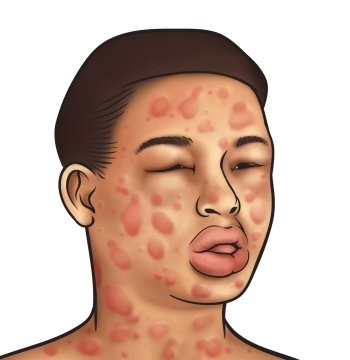First Aid - Allergic Reactions

Allergic reactions can be triggered by foods, medications, insect stings, pollen, or other substances. Although most allergic reactions aren't serious, severe reactions can be life threatening and require immediate medical attention.
Signs and Symptoms
Mild:
Severe:
Have kids avoid substances that are known to trigger an allergic reaction. Keep an oral antihistamine such as diphenhydramine available.
If your child has a severe allergy, be sure doctor-prescribed injectable epinephrine is kept nearby at all times, and that you, your child (if old enough), and anyone who cares for your child know how to use it.
Signs and Symptoms
Mild:
- itchiness
- skin redness
- slight swelling
- stuffy, runny nose
- sneezing
- itchy, watery eyes
- red bumps (hives) anywhere on the body
Severe:
- swelling of the mouth or tongue
- difficulty swallowing or speaking
- wheezing or difficulty breathing
- abdominal (belly) pain, nausea, vomiting, or diarrhea
- dizziness or fainting
- Contact a doctor if your child has an allergic reaction that is more than mild or concerns you.
- If the symptoms are mild, give an oral antihistamine such as diphenhydramine.
- If the symptoms are severe and you have injectable epinephrine (EpiPen), immediately use it as directed and call for emergency medical help.
Have kids avoid substances that are known to trigger an allergic reaction. Keep an oral antihistamine such as diphenhydramine available.
If your child has a severe allergy, be sure doctor-prescribed injectable epinephrine is kept nearby at all times, and that you, your child (if old enough), and anyone who cares for your child know how to use it.
- 7ka665ec1c8cb5527bb3792574644270d1.jpg